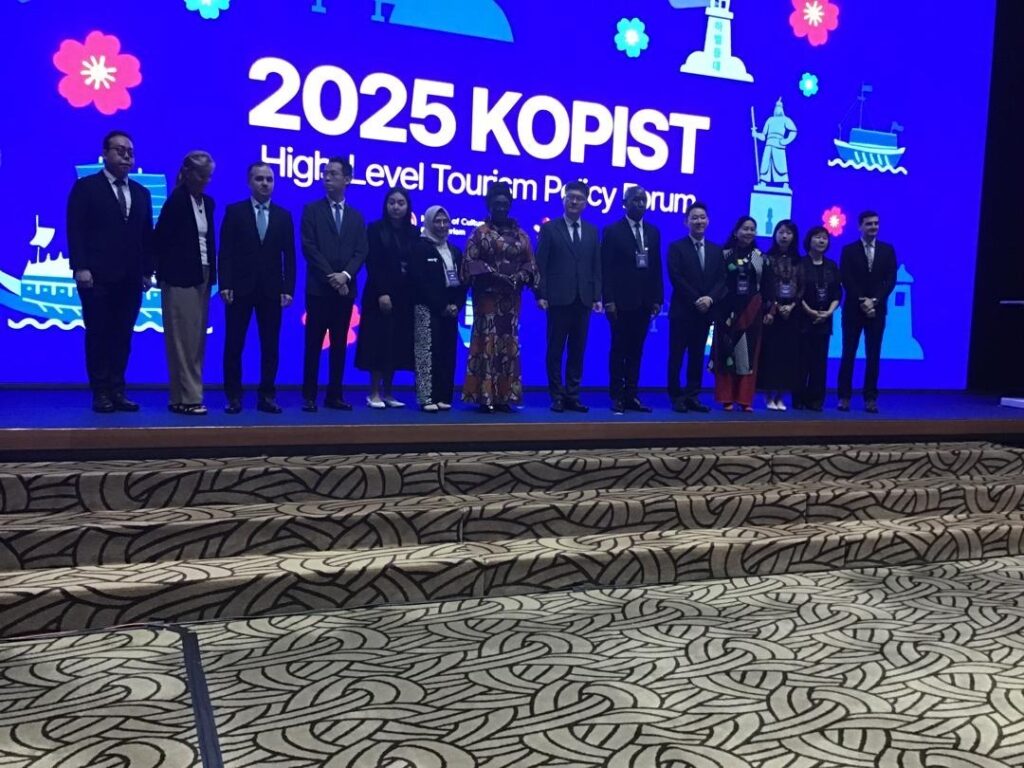
Ghana has reaffirmed its commitment to sustainable, inclusive tourism by championing Community-Based Ecotourism (CBET) at the 2025 Korea Partnership Initiative for Sustainable Tourism (KOPIST) Forum, held in Yeosu, South Korea on June 16, 2025.
The international forum, themed “Fostering Regional Development through Ecotourism,” brought together officials and tourism experts from eleven countries, including Azerbaijan, Bhutan, Indonesia, Kyrgyzstan, Laos, Papua New Guinea, Peru, Tanzania, Uganda, Vietnam, and Ghana.
Representing Ghana was the Minister for Tourism, Culture, and Creative Arts, Abla Dzifa Gomashie, who led a delegation from the ministry.
Ghana’s Model: Sustainability Through Community Engagement
Speaking during the forum’s session on Ecotourism Development and Sustainability, the Minister highlighted Ghana’s successful integration of traditional beliefs and environmental conservation through community-based models. She cited the Boabeng-Fiema and Tafi Atome Monkey Sanctuaries as exemplary projects that marry indigenous cultural practices with biodiversity preservation, empowering local communities while protecting endangered species.
She emphasised equitable benefit-sharing, capacity building, and community ownership and governance as key pillars of Ghana’s approach, crucial for fostering transparency, empowerment, and long-term sustainability in ecotourism.

Challenges and Proposals
The Minister acknowledged existing challenges, including limited funding and socio-cultural tensions, calling for stronger multi-sectoral coordination and inclusive governance frameworks to overcome these obstacles.
In a panel discussion on “Local Culture and Ecotourism,” she further underscored the value of local traditions in enhancing the visitor experience. She pointed to Ghana’s efforts to integrate traditional dance, handicrafts, cuisine, and oral storytelling into tourism strategies.
Her proposals included:
- Climate adaptation plans for coastal communities
- Academic partnerships to train professional tour guides
- Youth engagement through digital platforms
- Leveraging cultural assets such as Kente cloth through UNESCO World Heritage listings
These initiatives aim to position Ghana not only as a tourist destination but also as a model for culturally grounded, environmentally responsible tourism.

Learning from Korea’s Ecotourism Success
On the second day of the forum, Minister Gomashie visited key ecotourism sites in Suncheon, including the Suncheonman National Garden, the Suncheon Garden Worcation Centre, and the Suncheonman Wetland, known for its tidal flats and vast reed fields.
The tour provided valuable insights into Korea’s innovative conservation strategies, blending nature, tourism, and community participation—a model Ghana hopes to adapt to its own unique environmental and cultural context.
Ghana’s participation in the 2025 KOPIST Forum reinforces its leadership in community-led tourism development, paving the way for regional partnerships and knowledge exchange across the Global South.
Source: Public Relations Unit, Ministry of Tourism, Culture, and Creative Arts (MoTCCA)






